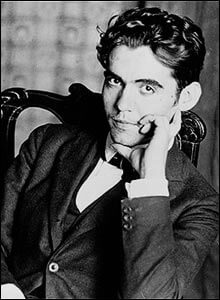Yesterday, I wrote about the dichotomy between the two Greek gods Apollo and Dionysus, and how we’re seeing it playing out in our household with our two sons, whose personalities seem to embody each of these natures. Today, I’d like to continue with the Apollonian and Dionysian discussion, and segue into a conversation about the Spanish notion of duende, which has fascinated me for years.
Duende can be defined as the dark soul that can inhabit works of art, that aspect of art that sends a chill up your spine, or moves you to weeping or other strong emotion. If art truly moves you, it has duende.
Frederico Garcia Lorca, a Spanish poet of the early 20th century, first articulated the notion of duende in art in a lecture in Buenos Aires in 1933. According to Lorca, duende accounts for artistic moments that seem to defy accountability, moments that are dark and deep, intimately connected with death. It is the polar opposite of the notion of a visiting angel, informing the artist.
In his writings on duende, Lorca connects the Apollo/Dionysus dichotomy, but in his words he imagines them as imagination/inspiration. He delineates the roles of reason (Apollo/Imagination) and irrationality (Dionysus/Inspiration). According to Lorca, the “severely logical imagination can do many things, but it cannot touch the darker forces of nature, or the most incandescent lights, or the realm of the unknown”, which are in the realm of Dionysus.
Lorca: Imagination’s “special manner of creation needs order and limits. Imagination is what has invented the four points of the compass and what has discovered the intermediate causes of things. But it has never been able to abandon its hands in the senseless, illogical embers where inspiration is stirring, free and unfettered. Imagination is the first step, the foundation of all poetry…the poet uses it to construct a tower against the natural elements and against mystery.”
He struggled, as a poet, with a need for order and an equally potent rage for chaos. This is the Apollo/Dionysus dichotomy played out in the creation of art.
The thought of duende and how it influences the artistic process is an endlessly fascinating subject for me, as both an artist myself and a mythologist interested in creativity. I know I’ll write more about it in the future, but for now, here’s a bit to think about.
P.S. I’ve been reading a great book on duende by Edward Hirsch, called The Demon and the Angel. I’d recommend it to anyone interested in duende.

